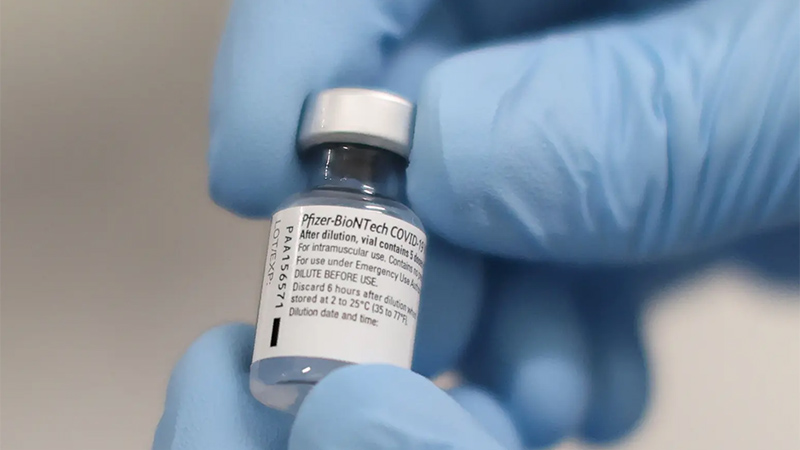COVID hospitalizations in Jefferson, surrounding counties lead to scale back
Published 12:17 am Wednesday, December 23, 2020

- A vial of the Pfizer/BioNTech COVID-19 vaccine, doses of which arrived in Texas last month. (Liam McBurney/Pool via REUTERS)
|
Getting your Trinity Audio player ready...
|
A release from the Southeast Texas Regional Emergency Operations Center only confirmed the breaking news of the day before — that nine counties in a Trauma Service Area will have to limit business to 50 percent of capacity and disallow elective surgeries due to high hospitalization rates related to COVID-19.
Jefferson and eight other counties were notified Monday in a letter from the Texas Department of State Health Services that their Trauma Service Area met Gov. Greg Abbott’s definition of a high hospitalization area under his GA-32 executive order, which was issued Oct. 7 and went into effect one week later. Jefferson, Brazoria, Chambers, Galveston, Hardin, Jasper, Liberty, Newton and Orange comprise Trauma Service Area R, one of 22 in Texas (lettered A through V) with each supervised by a regional advisory council with the goal of limiting trauma.
Abbott’s definition, according to the letter sent by DSHS Commissioner John Hellerstedt, reads:
Trending
“Any Trauma Service Area (TSA) that has had seven consecutive days in which the number of COVID-19 hospitalized patients as a percentage of total hospital capacity exceeds 15 percent, until such time as the Trauma Service Area has seven consecutive days in which the number of COVID-19 hospitalized patients as a percentage of total hospital capacity is 15 percent or less.”
No official comment from any of the county leaders was provided. Jefferson County Judge Jeff Branick could not be reached as of Tuesday afternoon.
According to combined hospitalization data from TSA R, 291 were occupied by lab-confirmed COVID-19 patients in the hospital as of Monday, for a rate of 19.74 percent. The last time the region was below the threshold of 15 percent was Dec. 8 (13.86 percent).
The rate spiked to 36.03 percent on Dec. 8 and 39.24 percent on Dec. 17, but dropped lower than 20 percent the next day on both occasions.
The region, which is home to an estimated 1.3 million people, has 248 available hospital beds, eight in intensive care units and 260 available ventilators.
Shortly after the Emergency Operations Center confirmed the business rollback, the Port Arthur Health Department announced the eighth death of a Groves citizen related to COVID-19.
Trending
The individual was a White female between 75 and 80 years old. The PAHD said she had underlying health conditions.
Throughout Texas, 10,009 persons with COVID-19 were currently hospitalized as of 5:01 p.m. Monday.
Other TSAs that must scale back business occupancy include Amarillo, Lubbock, Abilene, Dallas-Fort Worth, Longview, Lufkin, El Paso, Waco and Laredo. Galveston is considered the chief location of TSA R.
Counties have an opportunity to bring business back to 75 percent capacity under Abbott’s latest order. A county in TSAs with high hospitalizations may operate at that level if it has fewer than 30 cases reported over the last 14 days and the county judge attests that to the Department of State Health Services.
The daily total of confirmed cases in Jefferson County exceeded 100 Monday.
Elective Procedures
The Medical Center of Southeast Texas continues to proactively manage its COVID-19 population while providing elective procedures as detailed in the Governor’s Executive Order.
That was part of the statement released Tuesday by Angie Hebert, director of marketing for the Medical Center, which is located in Port Arthur.
“We maintain a highly developed plan and stand ready to serve our community’s health care needs,” the statement read. “Our elective procedures will remain scheduled as we closely monitor our COVID-19 population. As outlined in the executive order, we will cease elective procedures if it were to, ‘deplete any hospital capacity needed to cope with the COVID-19 disaster.’
Hebert said the Medical Center would govern its daily efforts within the guidelines set by local and state officials, “while thoughtfully and safely caring for those in need of our medical services.”
A similar statement was released by CHRISTUS Southeast Texas Health System about it continuing with elected surgeries.
In a statement provided by Nikela Pradier of CHRISTUS Health Regional Public Relations, the health system says as it is written, the governor’s executive order does not mandate that all elective surgeries must stop.
“It provides exemptions for those that meet specific criteria, including procedures that do not deplete our capacity to care for COVID patients or that are deemed medically necessary by the patient’s physician,” the CHRISTUS statement reads. “Because of these exemptions, we expect to be able to provide a full range of services – not just COVID care – and continue to provide outpatient elective procedures, including surgery, and other procedures that do not deplete our capacity.”
CHRISTUS Southeast Texas Health System said it is seeing an increase in the number of cases of COVID-19 and a rise in COVID patients in its hospitals.
“It is important that the public knows that our medical experts anticipated and planned for these surges, and we are ready to care for patients,” the CHRISTUS statement reads.
“This preparation includes closely monitoring vital medical supplies and equipment, as well as evaluating possible expansion of space and beds to care for COVID patients, should the need arise. Most importantly, the local community should know that CHRISTUS Southeast Texas Health Systems remains a safe, healing environment as we continue to meet the needs of our community.”








